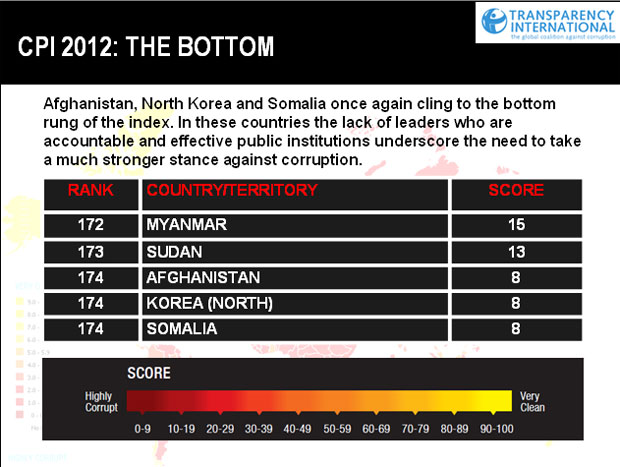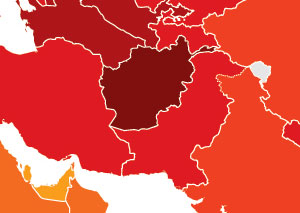The recent independent report on Kabul Bank scandal points out to the urgency to transform the country’s laws and institutions, from the financial sector to the justice system. The team that published the report are to be congratulated for shedding light on a “ponzi scheme” scandal that involves the theft of US$900 million.
It is also a timely reminder of the cost of corruption for countries at the bottom of Transparency International’s Corruption Perceptions Index, which will be published on Wednesday.
Last month, Transparency International’s chair Huguette Labelle reminded us that:
Countries at the bottom of our corruption indices remain largely failed states with repression of human rights, social chaos and continued poverty.”
Afghanistan is one such country. Sufficient evidence suggests that corruption in Afghanistan is getting rampant. According to President Karzai himself, the phenomenon is now at a level “never before seen”.
Such is the scale of the problem, that Transparency International’s annual meeting in November issued a resolution calling on donors to make aid flows more transparent and the government to display the political will to tackle corruption.
What does being one of the bottom countries on the index mean for Afghanistan?
Bertelsmann describes some of the ways corruption manifests itself in Afghan society: widespread charges of fraud and election-rigging; a judiciary subservient to the government and officials engaging in arbitrary arrest and detention, torture, extortion, and extrajudicial killings.
Corruption is also present in daily life and stands out in public surveys. According to Integrity Watch Afghanistan, one Afghan in seven paid a bribe in 2010 and the average bribe is equal to one third of the average Afghan salary.
Corruption in Afghanistan also impacts the international community, who need to start thinking long-term. According to an article from Huguette earlier this year, as much as $1 billion of the $8 billion donated in the past eight years has been lost to corruption. As much US$ 60 billion of military contracts have been lost to fraud and waste. The country receives $70 billion in foreign military assistance and development aid annually. Afghan government revenue was $1.3 billion in 2009.
The country’s future depends on tackling corruption more than almost any other. A Transparency International report last year warned:
Corruption, weak institutions and a lack of economic development pose a fatal threat to the viability of Afghanistan.”
The attention of media and international community are starting to turn to the 2014 elections as a key moment, but this Wednesday Afghanistan’s score in the Corruption Perceptions Index will send a different message. The country’s leadership must put a stop to the corruption practices in the country now, and not in 2014.
For starters, the government could take a critical step forward by bringing all the alleged perpetrators in the Kabul Bank scam to justice.
A question to the government, then, is: Will the government live up to these challenges—its own national priority?
Carousel image: Flickr/ Creative Commons: visionshare

















 Connect with us on Facebook
Connect with us on Facebook Follow us on Twitter
Follow us on Twitter